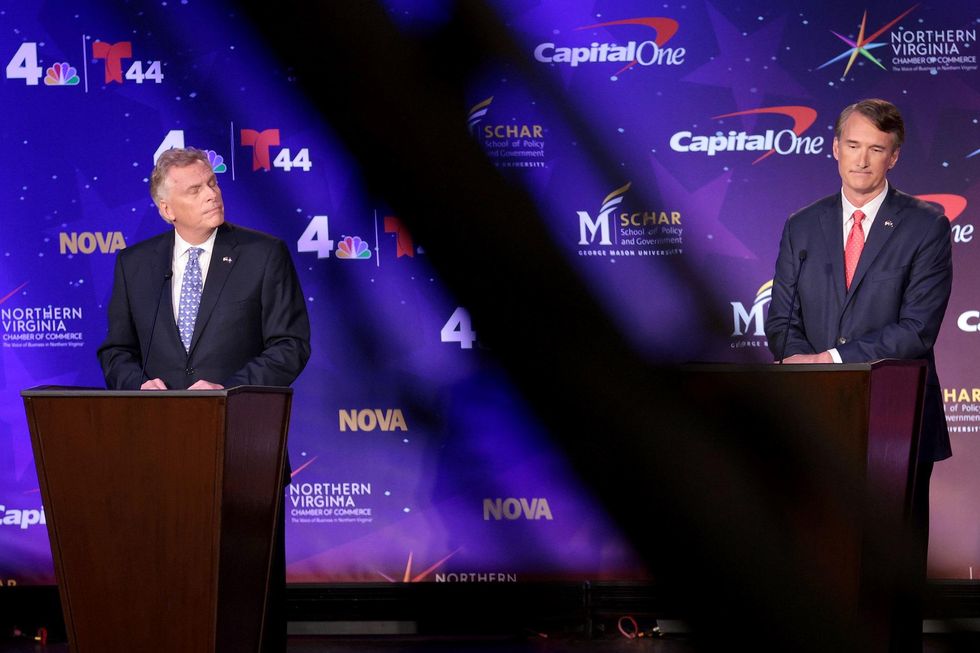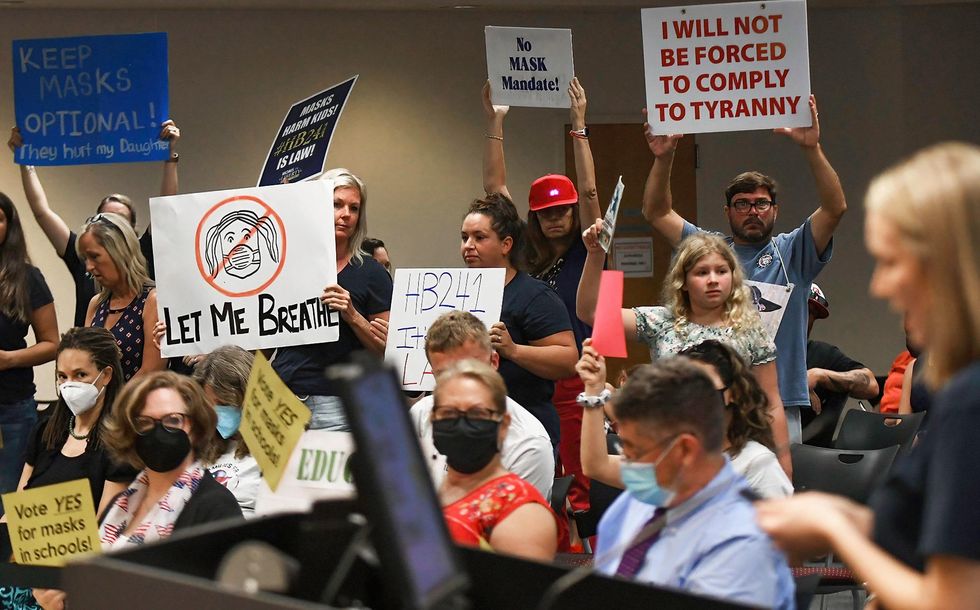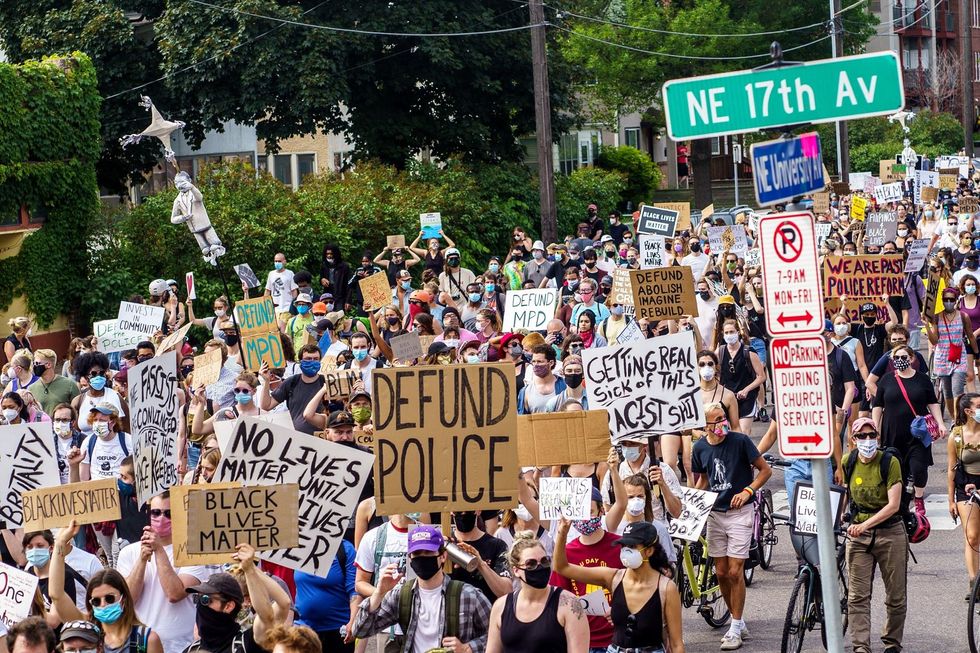Trending Now
We have updated our Privacy Policy and Terms of Use for Eurasia Group and its affiliates, including GZERO Media, to clarify the types of data we collect, how we collect it, how we use data and with whom we share data. By using our website you consent to our Terms and Conditions and Privacy Policy, including the transfer of your personal data to the United States from your country of residence, and our use of cookies described in our Cookie Policy.
{{ subpage.title }}
Top five US political moments of 2021
Well, I can think of five. The first and most important was probably January 6th. Historically important moment, rioters breached the Capitol building in order to stop the legal counting of the presidential election results, but also, it was an important moment because it created a dividing line for Republicans who had to decide if they were with President Trump, who had a role in instigating the riot, or if they were against him. A lot of Republicans ended up choosing to be with him creating various forms of apologies for the rioters over time, and even to some degree making martyrs out of some of them. This will be a really important defining moment, not just in American history, but also for the Republican party.
Second was the passage of the American Rescue Plan in the spring of this year. A $1.9 trillion bill that piled on top of the already $4 trillion in stimulus that Congress had passed in 2020 in order to help fight the coronavirus pandemic. Why was this significant? Because it wasn't necessary. What it ended up doing was overheating an economy that was already starting to recover from the pandemic providing households with $1,400 checks and continuing to pay people not to work and has contributed to the high pace of inflation that's been seen in the second half of 2021, which in turn has hurt the chances of President Biden's Build Back Better bill from passing into law. So this turned out to be a very significant moment even though it wasn't obvious at the time.
Third point, the withdrawal from Afghanistan. This is when you really started to see a steep decline in President Biden's approval ratings because the withdrawal got directly at the issue that he had built his campaign around, which is competence. The botch withdrawal, the headlines, the chaotic scenes at the airport really started to make it seem like perhaps the Biden administration didn't know what they were doing. That's been a drop from which they haven't recovered.
Also, something that happened over the summer I want to highlight was the CDC recommending masks indoors in response to the delta wave of the coronavirus. While I don't think this in and of itself was a politically significant moment, the return of the coronavirus in 2021 is going to be one of the defining things in Joe Biden's presidency. It's yet another reason that his approval ratings have been dragged so low and it's something that he just can't shake. This will be an ongoing storyline in 2022.
Finally, I think the fifth significant moment of the year gets at something else that's been hurting Joe Biden politically, which is inflation. He chose to renominate Jay Powell who was President Trump's fed chair because of the credibility Powell's built up as an inflation fighter helping the fed to pull out of the extraordinary measures they took during the pandemic and clear a path towards raising interest rates sometime next year. But his renomination is basically an endorsement of the fed's loose monetary policies and an endorsement of Powell's ability to keep inflation in check starting next year. This is going to be a huge story and it's a really big political priority for the Biden administration fighting inflation, and this is not the last you're going to hear about this.
2021: Groundhog Day in a G-Zero world
Did 2021 actually happen, or are we still stuck in 2020? So many things seem to have barely changed this year. After all, we’re entering yet another holiday season worried about a fresh wave of the pandemic, and uncertain about what comes next for our economies and our politics.
In a lot of ways, the past 365 days feel like a year of unfulfilled promise. Let’s have a look back at what did, and did not happen in 2021.
The year kicked off with US democracy in deep trouble: first the Capitol insurrection, and later Donald Trump's second impeachment over it. After Joe Biden was inaugurated as president, he told the world: America is back. (Spoiler: the world is still waiting.)
Global attention soon turned to the COVID vaccine rollout. It sputtered at first, but even when it got better it exposed deep divisions over things like health passes, vaccine mandates, and patent waivers. The vaccination gap between the rich world and everyone else was hard to ignore. Still, to have inoculated half the world’s population in under a year is no mean feat.
Middle East politics got hot again with a brief war between Israel and Hamas, Iran's presidential "election," and Bibi Netanyahu ousted as Israeli PM after 12 tumultuous years.
Then came a series of extreme weather events that focused everyone’s attention on climate change just months ahead of the COP26 climate summit. But first, the world watched in disbelief as the US chaotically withdrew from Afghanistan, and then the Taliban reclaimed power virtually overnight — right before the 20th anniversary of 9/11.
Like in 2020, global cooperation was hard to come by, as we saw a bit at UNGA but much more at COP26. The fact that even faced with such an existential problem, the world’s top polluters failed to agree on the same deadline for net zero emissions revealed again how fragmented global politics have become. Forget G20 or G7 — we live in a rudderless, G-Zero world.
In such crazy times, arguably the smoothest political transition came after the German election, with Angela Merkel handing over the reins after 16 years as chancellor — and Europe’s de-facto leader — to Olaf Scholz.
And now, as the end of the year approaches, we are about to mark the 30th anniversary of the Soviet Union’s collapse worrying about whether Vladimir Putin actually intends to invade Ukraine.
More broadly, there are three things that didn't really play out as many people expected they would at the start of the year.
First, US-China ties didn't get quite as bad as many feared. With Biden in the White House, the world’s two largest economies didn't exactly bury the hatchet. They remain at odds over trade, technology, Taiwan, the South China Sea, and Xinjiang. But they did find some common ground on climate — and domestic distractions for both countries helped quiet the rumblings of a new Cold War. (Not to mention a hot war, which as retired US Adm. James Stavridis told us, could start over Taiwan.)
The arrested development of deteriorating relations wasn't the product of anybody's grand design. Biden began his presidency with big foreign-policy ambitions, but he soon got bogged down at home by squabbling among Democrats over his domestic agenda, and later by Afghanistan. Xi Jinping, for his part, showed more interest in further consolidating his own power over tech giants, the Chinese economy, and the ruling Communist Party than in picking fights with Biden.
Whether the Cold Peace will hold in 2022 will likely depend on what happens inside each country, especially if they really start to recover from the pandemic.
Second, 2021 was the year of the vaccine, but the jabs on their own didn't end COVID. The good news is that vaccines were successful at bringing down deaths and severe illnesses. The bad news is that distribution was unequal, and hesitancy higher than expected in some places.
Where access to jabs was lacking, the delta variant brought a more deadly wave, like the one that ravaged India for weeks. (We spoke to Indian journalist Barkha Dutt the day after her own father had succumbed to the virus.) Now we are waiting to see how effective the current jabs are the face of omicron.
Finally, the post-pandemic recovery was not what we hoped for — mainly because we never made it to the “post-pandemic” at all. Even where economic growth rebounded to pre-pandemic levels, the lingering virus messed up supply chains (check out Ian Bremmer's explainer), drove up the prices of food, energy, and pretty much everything else.
US economist Larry Summers told us why he sounded the alarm bell on inflation earlier in the year. We also learned from LSE's Minouche Shafik about how women bore the brunt of the unequal pandemic recovery.
It’s been a disappointing year, but one way in which 2020 mirrors 2021 is that we end the year with fresh hope. Last year we looked forward to the arrival of the vaccine to change things. This year we look ahead to 2022 hoping that the current pandemic wave may be the last major one. Let’s see how our optimism fares this time around.
Election Day 2021: What you need to know
Election Day 2021: What you need to know
Off-cycle elections in the United States usually don’t matter much for policy, but voters are heading to the polls today in several races that will serve as useful barometers of the country’s political mood.
What makes today's elections interesting is what they could tell us about the political realignment happening within both parties in the run-up to the 2022 midterms and the 2024 presidential election.
Republicans are trying to figure out what kind of party the GOP is going to be when Donald Trump isn’t (yet) running, while Democrats are fighting the perception that they have become too aligned with the far left.
Virginia election a referendum on Trump, culture wars
The highest profile race is happening in Virginia, where former Democratic governor Terry McAuliffe is facing off for governor against first-time candidate and Mitt Romney Republican Glenn Youngkin, a multi-millionaire former private equity executive and religious conservative.
Virginia has trended Democratic in recent years due to booming population growth in the DC suburbs, but recent polling shows a very competitive race.
Want to understand the world a little better? Subscribe to GZERO Daily by Ian Bremmer for free and get new posts delivered to your inbox every week.
Sensing an opportunity to claim credit for a victory, former President Donald Trump waded into the race to campaign for the GOP candidate, whom he endorsed after winning the party’s nomination.
"We get along very well together and strongly believe in many of the same policies," Trump said in a statement on Monday. He encouraged his supporters to “flood the system and get out and vote” for the Republican candidate.
For months, Democrats have sought to play up Youngkin’s closeness with Trump, who lost the state by 10 points a year ago, in order to paint him as an extremist and turn off suburban voters.
"Since launching his campaign, Glenn Youngkin has made it clear he is running for governor for one person and one person only: Donald Trump. Now, with less than 24 hours until Election Day, Trump is helping Glenn close his campaign and rewarding his total allegiance for the last eight months," McAuliffe said in a press release on Monday, urging Virginia voters to “come together to REJECT Trump and send a powerful message to the nation: we are not going back.”
While Youngkin has expressed alignment with the former president, saying in May that "Trump represents so much of why I'm running," his campaign has since kept distance from Trump, steering clear of joint events with him and other polarizing figures like former White House advisor Steve Bannon. Trump held a last minute tele-rally for Youngkin on Election Eve, but neither Youngkin nor his surrogates participated.
Education has emerged as a major theme for Republicans in the race, hoping to harness the energy of parents in the DC exurbs who have started to organize against local school boards for their Covid mask mandates and alleged teaching of "critical race theory", the right's latest obsession. Youngkin has heavily criticized McAuliffe’s remarks at a September debate, when he said: "I don't think parents should be telling schools what they should teach."
“We will not teach our children to view everything through the lens of race,” Youngkin vowed at a rally on Monday. “So on Day 1, I will ban critical race theory from Virginia’s schools.”
 Former Virginia Gov. Terry McAuliffe (D-VA) (left) and Republican gubernatorial candidate Glenn Youngkin (right) debate on September 28, 2021. (Win McNamee/Getty Images)
Former Virginia Gov. Terry McAuliffe (D-VA) (left) and Republican gubernatorial candidate Glenn Youngkin (right) debate on September 28, 2021. (Win McNamee/Getty Images)
Republicans see these culture war battles as an opportunity to make up for losses in the suburbs that were incurred during the Trump administration and cost the GOP their House majority in 2018. While the McAuliffe campaign has treated these efforts as scaremongering, it is certainly taking the challenge seriously. The former governor has summoned all the major national Democrats—including President Joe Biden, Vice President Kamala Harris, and former President Barack Obama—in the home stretch of a race that polls say he could lose.
The school board issue has become a flashpoint around the country, as multiple school board elections have turned unusually partisan. Races will be proving grounds in a culture war battle between Republican-backed parents who argue that local schools are indoctrinating kids and Democratic-aligned school board members who see education about racism as an indispensable part of American history. Covid mask mandates are also an emerging theme in these races, which are normally not as divisive.
 School mask mandates have become a flash point of partisan culture wars. (Paul Hennessy/SOPA Images/LightRocket via Getty Images)
School mask mandates have become a flash point of partisan culture wars. (Paul Hennessy/SOPA Images/LightRocket via Getty Images)
NY, MN, NJ races test Dem unity, 2022 prospects
Several big-city mayoral elections are worth watching for what they say about inter-Democratic politics.
Normally, mayoral elections are strictly local affairs, but today a former police officer, Eric Adams, is likely to be elected in New York City, while both Democrats and Republicans in Buffalo are backing incumbent Democratic mayor Byron Brown as a write-in candidate to stop India Walton, a self-proclaimed socialist who defeated Brown in a low-turnout primary earlier in the year, from leading New York’s largest city.
Municipal elections in Minneapolis will put issues of policing directly on the ballot in a city whose leadership actively embraced the “defund the police” movement after violent protests broke out last year in the wake of George Floyd’s murder.
 Demonstrators march to defund the Minneapolis Police Department following the murder of George Floyd.(Kerem Yucel/AFP via Getty Images)
Demonstrators march to defund the Minneapolis Police Department following the murder of George Floyd.(Kerem Yucel/AFP via Getty Images)
New Jersey is also having a gubernatorial election today, but the state is so Democratic that even a moderate Republican candidate like former Assemblyman Jack Ciattarelli is unlikely to come close to challenging incumbent Democratic governor Phil Murphy. If he does, that would be a shocker of an upset win and a very bad sign both for President Biden’s fiscal agenda and the outlook for Democrats in Congress next year.
🔔 And if you haven't already, don't forget to subscribe to my free newsletter, GZERO Daily by Ian Bremmer, to get new posts delivered to your inbox.
